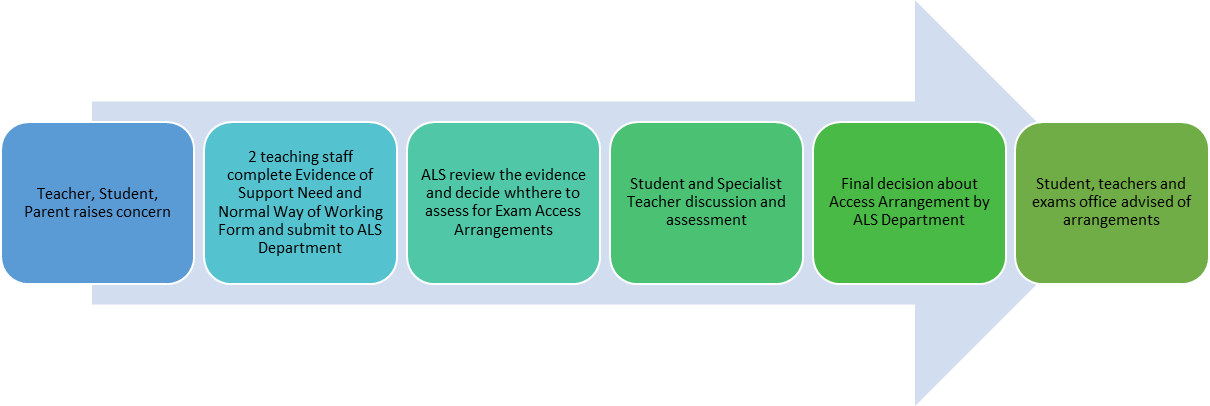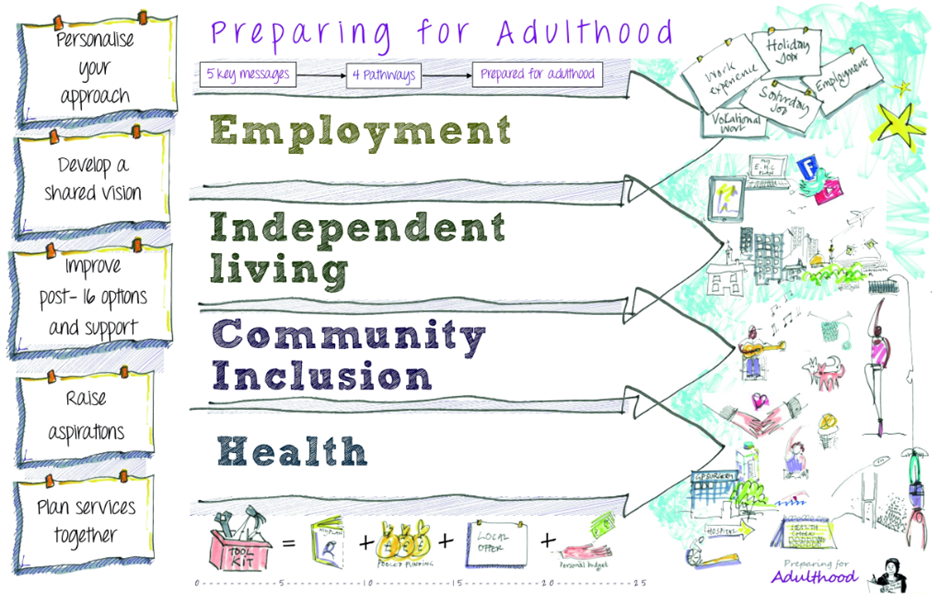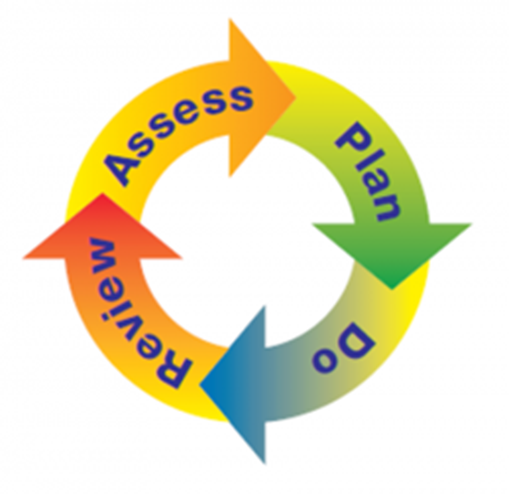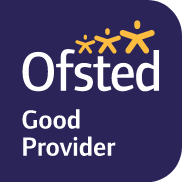
Additional Learning Support
The Additional Learning Support (ALS) Department Team provides support to all students with special educational needs and disabilities. We are a friendly team who believe that everyone can reach their potential with the right support in place. Any student who feels they need support can self-refer to the ALS Department.
Sixth form is a time for young people to develop their academic, social and life skills to prepare them for life after sixth form. All communication is with the student initially; however, we will include the next-of-kin for any SEND or additional needs support or provision.
If you need to contact the team, you can reach us at:
Who are we?
The ALS Team is made up of the following staff:
- Anna-Lisa Ghale, Head of ALS (qualified SENDCo)
- ALS Administrative Assistant
- Three Specialist Teachers who are all highly qualified and experienced and can assess students’ needs and access arrangements, as well as provide teaching and one-to-one support for students with EHCPs.
- A Social, Emotional and Mental Health Learning Support Practitioner who delivers interventions to groups and one-to-one in all aspects of social, emotional and mental health.
- A team of Learning Support Assistants who support students in lessons and during independent study time.
Between us, we have a wealth of knowledge and experience of all types of special or additional needs, and are passionate about supporting young people to fulfil their potential and successfully move to the next stage of their lives.
Campus Accessibility
The site is accessible with disabled toilets, ramps, lifts and automatically opening outer doors. Inner doors are not automatic opening, but students with mobility needs will be supported as required to ensure they can access all student areas of the site.
Classrooms vary in size, with the maximum class size being 24 students. Staff use their best endeavours to organise supportive seating plans based on each student’s individual needs.
We have 2 quieter spaces within ALS: one dedicated to independent study and one supported space. Our Learning Support Assistant team can support you in all the ALS Spaces. We run a variety of lunchtime clubs in the ALS Rooms which can vary from term to term, such as Film Club, Connect Club, Switch Club and VR Club. Clubs are open to all and are a great way to meet other people and gather as friends.
Admissions Criteria for students with EHCPs (Education Health and Care Plan)
All students, regardless of EHCP, must qualify for the course they wish to study. Instructions on how to apply to Long Road can be found on the Join Our College section of our website, as well as through consultation with the student’s Local Authority.
We strongly advise that students visit Long Road Sixth Form College during our Summer Term Open Evenings, or book to attend one of our Autumn Term tours with the Additional Learning Support team. Please be aware we can only offer a limited number of tours, and spaces book up quickly. We strongly recommend attending an Open Evening wherever possible.
At the year 11 annual review of the student’s EHCP, a request can be made to their Local Authority to explore a placement at Long Road Sixth Form College. The Local Authority will consult the college about a placement. If the student qualifies for the courses they wish to study, and the college believes it can meet the special educational needs and provision and the student has completed an application to the college, then they will be offered an Advice and Guidance meeting in the Spring Term and a conditional placement based on predicted GCSE grades may be made.
We recognise that the transition from secondary school to a large sixth form college can be daunting. The step up from GCSEs to level 3 study is considerable. We offer transition afternoons in the summer term, in addition to the college Welcome Days.
To ensure we have up-to-date information about everyone’s support needs, we liaise with secondary schools and other educational providers to produce a Transition One Page Profile which summarises support strategies. Staff refer to these at the start of term to ensure that students’ needs are met in lessons. One Page Profiles are co-produced with students and are a live document which is updated when needed.
Exam Access Arrangements
A student may have had examination access arrangements and reasonable adjustments for GCSE exams. To continue these arrangements at Long Road Sixth Form College students must check that we have received their Form 8 or 9 access arrangement record from their previous school. Please do not assume that this information is automatically passed on to us. We expect to finalise examination access arrangements for year 1 candidates by the end of the Autumn term.
Access arrangements assessment is available through college. We will request medical or diagnostic evidence to support each application.
Any access arrangements must be agreed well in advance of any examinations and will become the student’s normal way of working.

Equipment
We recommend that students bring and use their own devices for word processing and coloured overlays that they require. Students must inform ALS of their use of an overlay and the colour they need, and whether they need coloured paper to be used in handouts. Students must bring their own notebooks in the required coloured paper. Students can change the background colour of any device they use; help is available on how to do this through our IT Services Department.
For students who do not have access to a laptop, an application can be made through ALS for a college laptop. Students who need to use a scanning reading pen can borrow one from the ALS Department (a small deposit may be required).
The college access arrangements policy is available here: https://www.longroad.ac.uk/page/?title=Our+Policies&pid=25
Support for EHCP and Additional Needs
EHCP Support
Students with EHCPs will be offered the minimum of a 30-minute meeting each week with a specialist teacher. During these sessions, students receive extra teaching or interventions which are listed in their EHCP. Their specialist teacher acts as a key-worker and will support communications with staff, help with organisation and other practical matters.
Some students have one-to-one support from a Learning Support Assistant (LSA) in lessons. These students will have this provision detailed in their EHCP. Other students with EHCPs may have a share of an LSA in lesson or have LSA support in Study Plus time or longer term scheduled one to one support.
We work to the Preparation for Adulthood framework to support students towards independence. Once a student reaches the age of 16, their EHCP becomes theirs. Whilst we include parents/carers in their educational progress and post 18 options, the students' views are paramount, and we work closely with them to ensure that their EHCP continues to meet their needs.

Additional Needs Support
Students with additional needs have reasonable adjustments put in place by the college as part of the universal offer. The following targeted provision is available for students with SEND or additional needs and who are not in receipt of an EHCP.
Mental Health
- VR headsets with relaxation programme
- Drop in support
- Emotional Regulation Interventions
- Peer Mentoring for Autism
- Autism – Being Me intervention
- ADHD Workshops
- Referrals to CAMHS for ADHD, ASD assessments
Learning Needs
- Study Skills drop in
- 1:1 scheduled study skills
- Investigation of learning needs
- Exam access arrangements assessment
- Short-term support
- Long term additional needs support
- Referral to external agencies
- Application for an EHC needs assessment which could lead to an EHCP
Study Skills
- Drop in support
- Scheduled one off/short term support
- One-off meeting with a specialist teacher
- Time-limited sessions with a specialist teacher
Social Skills
- Supervised social spaces
- Clubs
- VR Headset activities
- Social Skills interventions
- Early Help Referrals
- Specialist referral for a support worker for an autistic / learning disabled young person to access leisure outside of college hours
Assess, Plan, Do, Review Cycle
Students who are identified by any staff member as needing additional support due to significant difficulties with learning and progression are referred to the ALS Department. Usually, a meeting is held with the student, their parents/carers and the referring member of staff to identify barriers to learning and supportive ways forwards. The discussion will be recorded on an Assess, Plan, Do, Review (APDR) document which is then shared with all parties and forms an outline of the needs, and support to be put in place. All interventions are evaluated for impact and progress will be reviewed at a follow-up meeting. A student can go on to have several cycles of APDR until the issues are resolved. If three or more cycles of APDR indicate more severe needs or a student requires more resources to support their needs, we may look to apply for an EHC needs assessment with the student’s home Local Authority.
Assess
Identify the specific difficulties/problems the student is facing.
Plan
Plan how the college, the student and the parents/carers are going to work to resolve difficulties, and identify timescales for support.
Do
Implement support and measure impact. Are the difficulties being resolved?
Review
What has worked and what has not worked? Has the issue been resolved? What further support is needed?

Special Educational Needs Register
As a college, we do not keep a formal SEND Register in the same way as a school. However, we do keep a register of reported needs to ensure that we identify the diversity of students. Any student who feels they need support can self-refer to the ALS Department.
Applying for an EHCP, ADHD and Autism Assessments
Applying for an EHCP
Once a student is 16 years old, they are able to apply for an assessment of their special educational needs from their Local Authority. Usually this is done in conjunction with ALS staff, but students can also complete the application themselves.
- Click here to visit the Cambridgeshire County Council EHCP webpage.
- Click here to visit the Hertfordshire County Council EHCP webpage.
Referral for ADHD and Autism Assessments
Links to Useful Organisations:
Local Offers
- Cambridgeshire SEND Information
- East Cambridgeshire Local Offer
- Hertfordshire SEND Local Offer
- Essex SEND Local Offer
- Suffolk SEND Local Offer
- Norfolk SEND Local Offer
- Bedfordshire SEND Local Offer
- Peterborough Local Offer
Dyslexia / Dyspraxia / Dysgraphia / Dyscalculia
- British Dyslexia Association
- Dyslexia Action
- Dyslexia UK
- Dyspraxia Ireland
- International Dyslexia Association - Understanding Dysgraphia
- National Numeracy - What is Dyscalculia?
Developmental Language Disorder
ADHD
- NHS Cambridgeshire Community Paediatrics - ADHD
- ADHD Foundation Neurodiversity Charity
- ADHD UK
- ADHDadultUK
- ADDitude








